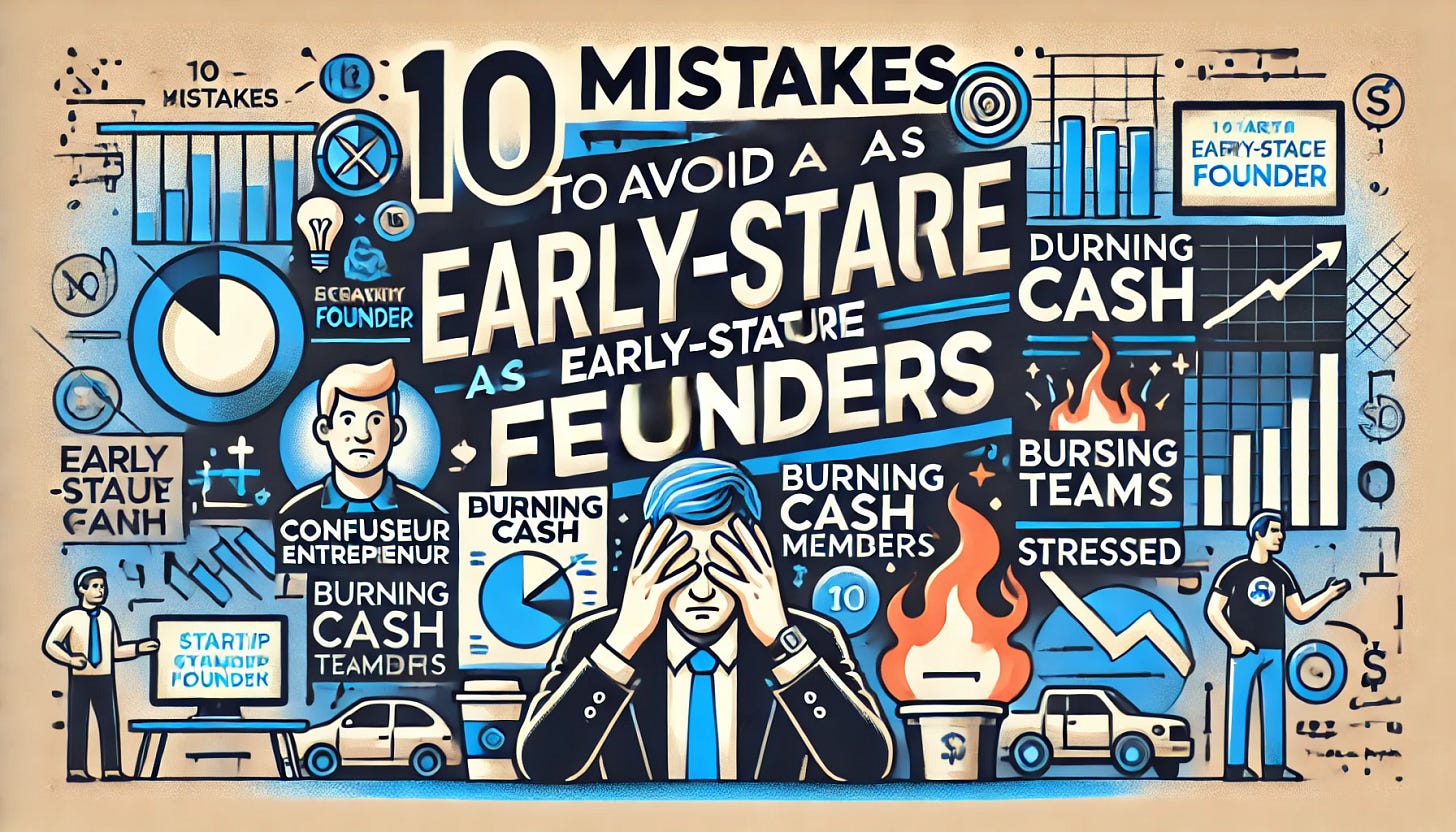10 Mistakes to avoid as an early stage founder!!
These are the mistakes I did and I would advice the younger version of myself and budding founders to avoid while building a business!
When I was 26-27, I started building Fello. I was one of the founding team members of an early-stage business, Koinex, which scaled phenomenally and taught me invaluable lessons! With that confidence, I decided to build my own venture. My experience at Koinex helped me a lot in my founder journey. But one of the harsh realities that hit me was: “Being a founding team member and being a founder are two completely different things.”
While I was able to capitalize on my learnings, I also made mistakes that I only realized the hard way. If I were to build another business, these are the mistakes I would avoid for sure!
10 Mistakes I Made as an Early-Stage Founder (And Would Avoid in the Future)
(I will write in detail about each mistake shortly along with some real examples)
1. Don’t fall into the rabbit hole of ‘The Next Feature Will Make the Product Big
As a founder, you will fall in love with your product and might go into denial when things don’t work. You’ll always feel that the next feature update will make the product succeed. This is where you need a reality check.
Test all your ideas quickly. If you have 100 things you want to implement, do them fast. If the product still doesn’t work—stop, take a hard call, and pivot if needed.
2. Don’t hesitate to let go of inefficient people fast
One of my biggest mistakes (and a costly one) was not firing ineffective team members quickly. I tried to keep team morale high by giving chances, but it actually made things worse. Eventually, I had to fire fast, and for that, I was criticized for hiring fast and firing fast.
Later, I refined my hiring process, sought advice from founder friends, and made more strategic hires. Lesson: Take your time hiring, but if someone isn’t working out, let them go quickly.
3. Don’t focus on multiple problems at once
As a founder, you’ll have a never-ending list of problems to solve. The reality is: You can’t solve them all at once! Trying to fix everything at the same time leads to split focus and delays solutions.
Once I started solving one problem at a time, execution became much more effective, and my anxiety levels dropped significantly.
4. Don’t obsess over competition
Everyone around you—team, investors, advisors—will talk about competitors. You’ll see them raising funds, and acquiring users, and it can feel overwhelming.
But your real focus should be on your customers and getting Product-Market Fit (PMF). The market is big enough for multiple winners. I wasted a lot of time worrying about competitors. If I were to do it again, I’d stay aware but not obsessed.
5. Don’t rush senior hires due to time pressure
Your senior leaders carry the business in your absence. Hiring them under a time crunch is dangerous.
I made hurried hiring decisions for senior roles and skipped thorough background checks just because someone nailed the interview. Later, this cost us heavily in time and operations.
Take time to hire experienced leaders with whom you have great personal rapport. As my investor, Charlie Songhurst, said: “The people you hire in peacetime are better than the people you hire in wartime.”
6. Don’t spend on marketing before achieving PMF
A classic startup mistake. Spending money on marketing without PMF is like burning cash.
Yes, you can grow numbers by spending money, but it won’t be sustainable. Scaling before PMF is a dangerous game. Post-PMF, marketing spends are an investment; pre-PMF, they are just an expense.
7. Don’t focus on vanity metrics like DAUs/MAUs—Retention & Revenue are king!
It’s easy to get excited about Daily Active Users (DAUs) and Monthly Active Users (MAUs). But if you have 1M users with no revenue and an 80% churn rate, what’s the point?
Initially, I focused too much on DAUs/MAUs until my advisors pushed me to focus on revenue and retention. Hard decisions followed, but they paid off.
8. Don’t hesitate to share problems with VCs and advisors
Your VCs and advisors have seen it all—as operators or investors. Any problem you face, they’ve likely dealt with before. Use them!
At first, I hesitated to share challenges—from co-founder conflicts to operational crises. Once I started opening up, they stepped in with actionable solutions and key connections. I wish someone had told me this earlier!
9. Don’t have too many investors on your cap table
More investors = More responsibilities = More complexity = More wasted time.
If you take small checks from too many investors, it creates an operational nightmare—tracking signatures, compliance, and approvals. I wasted too much time managing investor relations.
Use Roll-Up Vehicles (RUVs) for small-ticket angel investors and keep the cap table simple. Also, a cap table management tool is a game changer.
10. Don’t think you know everything—Accept that you don’t!
You grow when you accept your limitations. If a task takes more than 40% of your bandwidth, hire for it and delegate.
For the first year, I tried doing too much myself. Big mistake. Time is your biggest asset—spend it wisely.
Final Thoughts: Mistakes Make You, But Learning from Them Defines You
I have more operational mistakes to share in another post. But these 10 mistakes are ones every early-stage founder should avoid for the long-term health of their business.
If you’re an early-stage founder (or aspiring to be one) and are struggling with any of the above challenges, I’d be happy to connect and help. Feel free to reach out on LinkedIn, Twitter, or email. You can also book a call with me.
Also, if you found this post valuable, consider sharing it with other founders and subscribing to my newsletter. More startup insights and lessons coming soon!
Cheers & Happy Building! 🚀

